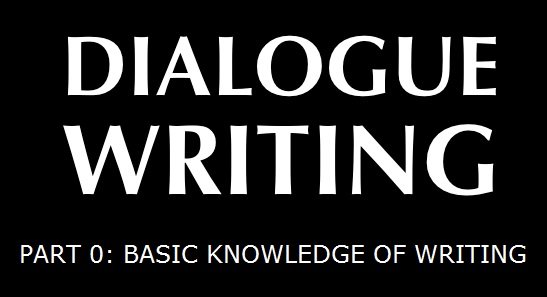
Hello Steembuns, I'm starting a series that helps everyone improve their skills in dialogue writing. This series is gonna be long, as dialogue writing is a huge concept and is also probably the most important and necessary skill for anyone who's aspiring to become a professional writer for novels or any writing jobs.
In this zeroeth part, I won't be going into technicalities of writing dialogue but will only talk about the basics that revolve around writing well in general.
First of all, what is fiction?
Fiction is not real, but it resembles reality.
It’s a writer’s duty to mold the story so that it feels real. And there's your fiction.
Now, are you a good writer? What do you think about your own writing?
If you think it’s great then that’s fine. But before you reassure yourself again, just go and ask ten more people (asking avid readers or writers would be good) on how they feel about your work.
And...
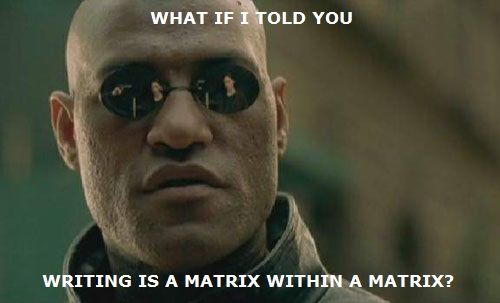
WOULD YOU BELIEVE ME?
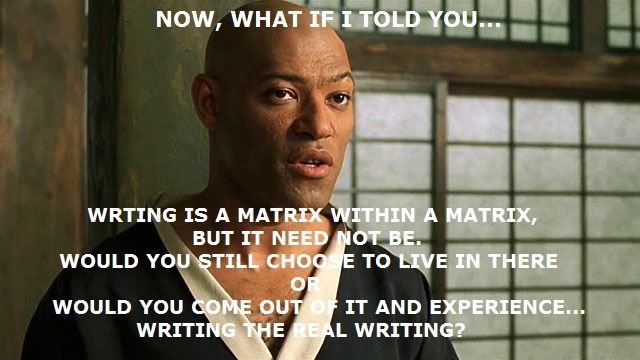
WELL...

If you chose to come out of the matrix, then I appreciate that but I won't congratulate you just yet, because you just started and there's still so much more to do... If you chose to not come out, however, you can rest inside as you always do.
Now, to those who got out of the shell where dreams delve in, let's now delve in reality, shall we?
No matter what you may think about your writing, it doesn't matter. If you are writing for the first time, then your writing most likely sucks. I've been there, and trust me, every good writer's been there.
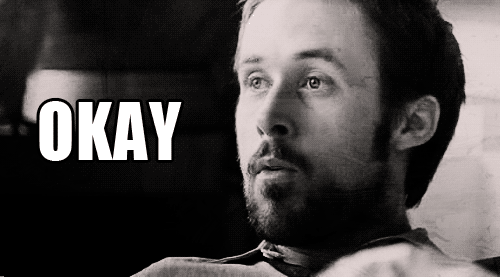
The sad truth is, you may think your writing is great, but if most others think it’s garbage, then I think you should consider changing your style of writing. Because there’s something seriously affecting your novel in a wrong way. It need not be plot by any means. It may just be the way you write from how you construct a dialogue and let the characters interact to how your basic writing style is in itself.
To learn to run, you should first learn to stand. To learn to stand, you should first try. And without a doubt, you’ll fall many times before you finally stand on your feet and be able to walk without falling no more or at least not as often.

And, in a similar way...
To write well, you should first know how not to write. And also to not write well in the wrong place, like the kid who stood correctly but was standing at the wrong spot...
Because, if you don’t know how you should not write, you may think that crawling is actually walking.
A kid may think he’s walking while he’s still crawling on four legs. Only by looking at other adults (not other kids), will he learn that he’s doing it wrong and that he needs to stand on his two legs.

Only by reading and analyzing how other good writers are writing, and comparing it to what you wrote, will you be able to tell not only how different both the writing styles are, but how the other writers are conveying their messages using their scenes. Their fights may just be one page in length, while you are using twenty pages. Their love scenes may be five pages long, while you are only using a paragraph or two for that.
Depending on the genre you’re writing in, your scenes can vary with other writers. So look at other novels that are of the same genre. But don’t follow them blindly.
Even some established writers write many anti-climatic scenes i.e. They build the tension for a scene from quite a few chapters only to end it in a single paragraph much less a page. For example, imagine how if you trained your protagonist for the first hundred pages of the novel by teaching him this martial arts and that martial art and whatnot, but when the time comes for him to actually fight for the first time, he’s surrounded by a dozen or even a hundred men, but you just kill them all off in a paragraph or two. This tactic of extremely short fights can be used by overpowered characters, but still they should be handled correctly, or else the fight scene will simply be bland. Your readers will forget the scene as fast as they finished it.

Do you think, a protagonist who’s in his first fight can fight with a dozen men and face no problem whatsoever? I’d say that’s bullsh*t. He must be going through tons of psychological stress as he goes through the fight, be it excitement or trepidation or disdain, whatever it is, you should show that. Let the readers know about the characters, let them relate to the characters. Only that will save your novel and will keep the readers continuing even when they don’t like where the plot may be heading. Because they are already invested in your characters as they got to know them, from in and out.
To be able to write good characters, you obviously should know how to write good dialogues. Without dialogues, it’s impossible to write a novel, because the resulting book would be the worst thing your reader has ever read, a three hundred page of mess that messed up their brain.
Sometimes you should know to write more.
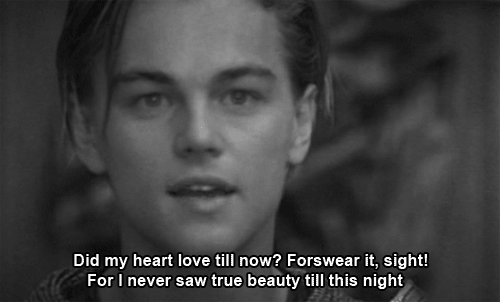
Sometimes you should know to write less.

Sometimes you should know to not write at all.

So before writing anything, any scene, just take a break for a second, and think for yourself, whether that scene makes any sense from the point of view of the characters involved in that scene. What are their backgrounds? Think on how you can improve it. The ideas won’t come suddenly, but you don’t have to write everything in the first attempt itself. When you get a new idea, you can always come back and edit that scene, and thus make it rich.
If you keep writing, reading and researching, then you’ll automatically learn all the necessary nuances of the writing eventually. Then you can get creative and develop your own style of writing. Actually, you’ll already have a style by then, but you just need to realize that and maintain the similar level for all your work because your readers will be expecting that from you.
If you don't know how to control yourself during writing... This is how the result may very well end up.
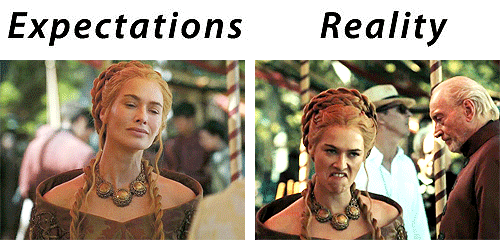
If the readers don't think that the character shouldn't behave like that, then they are gonna come at you hard... Understand that readers get merciless when you don't meet their expectations. This is reality and remember that you're no longer in the matrix.
If you want to know how to write to meet their expectations, don’t just read novels as a reader, but read them as a writer. Then, trust me, you’ll find goldmines in their text. Each decent novel you read, will teach you at least one new good thing. I can totally vouch for that.
However, to be able to analyze those novels, you first need to how to crawl. But sadly crawling is not intuitive to writers as it’s to kids. It doesn’t come to us genetically. Well, maybe if you are Stephen King’s children, it could be case.. But I’m positive that’s not the case.

So, you should find resources online, and learn how to write novels, the stages that exist in writing from first draft to publishing, and what you do in each of those stages. From basic level to deep level, research as deep as you can. But don't blitz through the process and marthon it instead. If you learn something fast without proper basement, you're more likely to forget it fast as well.
So... what kind of things would you be learning in these series? All of these relate to dialogue writing in one way or the other Here are some examples: Conflict, tension, setting, Direct and Indirect dialogue, show vs tell, tags, cues, characterization, redundancy, deep pov, adverbs, body language, hesitancy, manners, realistic characters, and the list goes on...
Some of the few additional things that you'll also be learning through this series along with learning to write good dialogue are:
How should the punctuation be?
How should the indentation for paragraphs be?
What’s the basic followed font style for a set medium?
What is a chapter? Are chapters even necessary in writing a novel?
What’s a plot twist? What’s a hook? What’s a cliffhanger?
What’s a genre?
What’s a POV?
Which age group are you writing for?
You can’t know all these in a single day or two. Nobody can. So don't force yourself, 'cause if you do...

If you are already experienced, then you might learn a new thing or two. If you are new to all these, then grip on all these will come over time, as you continue writing and researching as frequently as you can. You don’t need to that every day. Just do it whenever you are interested. That’s the only way to become aware and accustomed to all the necessary stuff.
If you are wondering that all the professional writers remember all the technical terms...

Do not worry. That's not the case. Only non-fiction writers need to bother more about such stuff.
You don’t need to know all the technical terms that some writers know and care about. We are fiction writers, not English professors. So don’t worry if you don’t know a certain term that other writers know. I’m sure when you become a decent writer yourself, you’ll have your own certain vocabulary that the other writers in your circle don’t know of.
But know that, as a writer, you have the most powerful tool than anybody else in the fictional world you created. With enough knowledge of the world you created, you can stir with your audience hearts and take them for a ride they’d never forget.
Let me give a clear example for that.
Here are two different dialogue that have same speech:
“I’m so sorry,” Jane told John, after the unseen collision spilled coffee on his shirt.
Jane apologized immediately in that scene which makes her seem as a good character. But then, how about this?
“I’m so sorry,” Jane told John, after deliberately kicking in his nuts.
She kicked John knowingly...and is pretending to be asking for an apology. Just the little addition of the detail will change entirely change the personality of Jane and how readers view her as a character.
So, as a writer, you are basically the god of your novel, and you decide how a character in that world will be viewed upon by the readers.

And there isn’t any best tool to achieve that god-like status, than the dialogues themselves. They are so powerful that you will never regret knowing more about the ways of writing great dialogues.
A good writer is not necessarily the one who writes complex sentences that are grammatically correct.
A good writer is not necessarily the one who can create great characters.
A good writer is not necessarily the one who write complex stories.
A good writer is definitely the one that can write a novel which can be understood by many.
The last thing you want is for your readers to scratch their heads in the middle of reading a paragraph, and then open internet to check for English grammar on how many types of compound sentences there are, and how they work. Trust me, they’d rather put the novel down or throw it in the fireplace.
Try to keep things simple.
If you don’t know that, at least try to make them appear simple.
Most of us don’t know how the internal mechanisms of cars and flights work, but we all drive them because we are given abstract mechanisms. All the technical stuff was encapsulated inside the car and all you need to worry about was the steering, breaks, gears and few other typical stuff.

Poor dog = Readers who are reading messy novels.
So do the encapsulation. If you don't know, then learn the craft. I'll give you as many examples in this series as I can.
In a similar way, you need to make sure you make your novel appear simple to the outside. This will actually add layers to your writing. You will become not just a good writer, but a great one.
I hope I gave some barebones knowledge on writing, and I hope you all will learn from it and also teach me something through interaction.

That sure drained all my energy and I needed a drink. You too can have one for making it here.
Have a great day or night wherever you are.
Hi. I am @greetbot - a bot that uses AI to look for newbies who write good content.
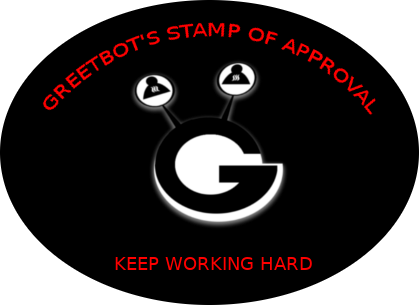
I found your post and decided to help you get noticed.
I will pay a resteeming service to resteem your post,
and I'll give you my stamp of automatic approval!
Downvoting a post can decrease pending rewards and make it less visible. Common reasons:
Submit
Thanks. I appreciate it.
Downvoting a post can decrease pending rewards and make it less visible. Common reasons:
Submit
Resteemed by @resteembot! Good Luck!
The resteem was payed by @greetbot
Curious?
The @resteembot's introduction post
Get more from @resteembot with the #resteembotsentme initiative
Check out the great posts I already resteemed.
Downvoting a post can decrease pending rewards and make it less visible. Common reasons:
Submit
Hmm, I'll check the resteemed posts when I have time. Thanks for the help.
Downvoting a post can decrease pending rewards and make it less visible. Common reasons:
Submit